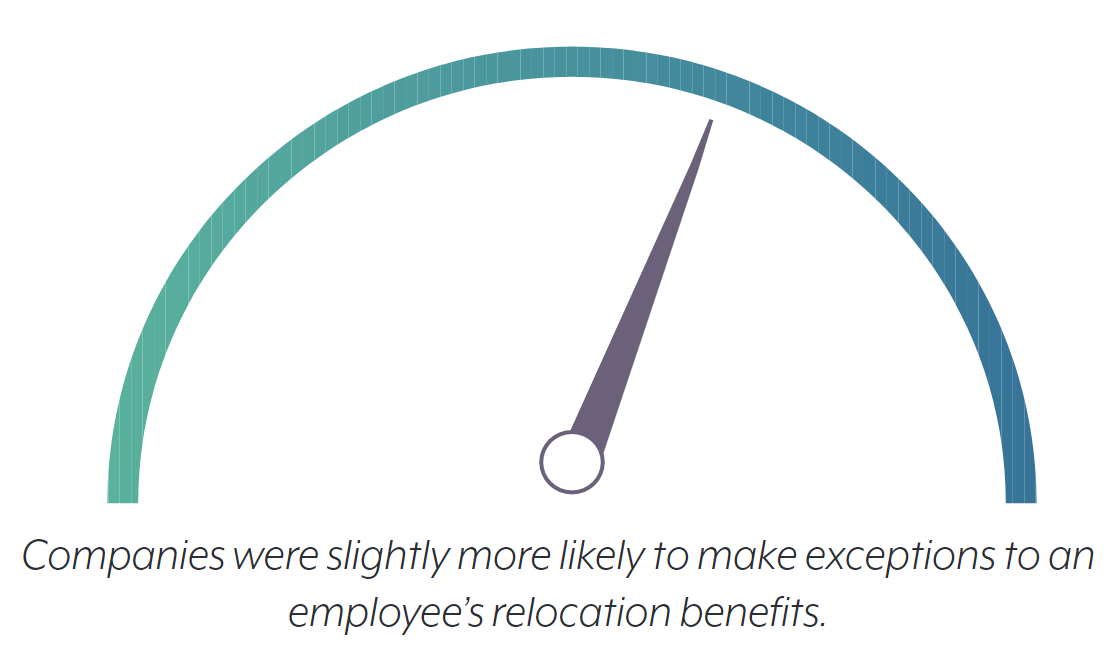有时,无论您的员工搬迁管理政策多么详细和具有包容性,您都会遇到员工提出的例外或特殊要求。这可能包括想带孩子去看房子、需要额外一个月的临时住房、搬迁宠物或要求延长家用物品的存储时间。搬迁一揽子计划和其他搬家福利可能差别很大。
在搬迁之前和搬迁过程中会出现一些特殊情况。需要搬迁支持是不可避免的。这也是大多数公司允许政策例外的原因。
我们的《2018 年流动性与文化基准研究》发现,只有 28% 的公司认为自己拥有灵活、易于调整的迁居方案。其余 72% 的公司则倾向于严格遵守其概述的方案。尽管大多数公司都坚持自己的异地安置方案,但有 64% 的公司表示,他们更有可能对异地安置员工的政策做出例外处理。

例外管理是任何公司搬迁计划的重要组成部分。政策的制定要考虑到大多数搬迁员工的需求;然而,没有两次搬迁是相同的。
1.管理期望值,最大限度地减少例外情况
在聘用新员工或为现有员工办理调动手续之前,彻底审查并了解您、您的迁居管理公司(RMC)和您的员工之间的期望非常重要。对员工的特殊需求和担忧采取积极主动的态度,是管理例外情况的最有效方法。您的异地安置管理公司还应花足够的时间与调职员工一起审查适用的政策,以便他们的期望与您的计划参数保持一致。花在管理期望值上的时间是值得的,因为这会减少政策例外情况的发生。重要的考虑因素包括搬迁支持、搬迁福利和潜在的搬迁补偿。
2.现实、博学、灵活
在迁居过程中,知识就是一切。在 "流动+文化 "调查中,我们请受访者提供他们最常见的例外情况。以下是我们的调查结果:
%
临时住房
%
福利/时限延长
%
其他家庭用品服务
%
家庭用品存储
%
额外津贴
只需了解最常见的搬迁例外情况,就能帮助您为今后的搬迁做好准备。您在审批时会更加现实,在提供服务时也会更加灵活。
3.为不可预见的搬迁事件做好准备
没有人能预测转让的所有可能结果。如果老房主无法像预期的那样尽快完成新房的交易怎么办?如果家用物品被海关耽搁数月怎么办?由于这种情况很少发生,因此大多数员工调动保险都不包括这种情况。
但是,万一发生意外情况,您的租赁管理中心必须能够迅速适应和处理这种情况。关闭延迟可能意味着需要额外的临时住所,而额外的临时住所可能意味着需要额外的家庭用品存储。搬迁异常管理的目标是保持积极主动,在员工还不知道自己的需求之前就预见到他们的需求。请务必与您的 RMC 沟通,了解其中一些可能出现的搬迁意外情况以及如何进行管理。
4.跟踪和报告
只有 64% 的公司利用技术手段对政策进行例外跟踪。跟踪和报告例外情况(包括调职前批准的例外情况)的能力为贵公司提供了一个切合实际的费用预期基准。这还能让您估算未来搬迁例外申请的成本,并据此做出政策调整。
5.改进搬迁例外政策
我们相信(并且通过我们自己的工作也看到),在您的计划中密切关注搬迁套餐例外情况的趋势,可以为政策修订提供机会,从而省去多次处理同一例外情况的耗时工作。然而,我们发现,只有 62% 的公司会根据异常情况对其迁居套餐政策进行修改。政策建议和改进应由您的搬迁公司持续提供。这将最终帮助您控制成本,吸引并留住最优秀的员工。

